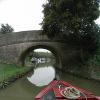Wright's Lane Bridge No 45 carries the M1 motorway over the Grand Union Canal (Grand Junction Canal - Main Line - Norton to Gayton) just past the junction with The Chelmer and Blackwater Navigation.
The Act of Parliament for the Grand Union Canal (Grand Junction Canal - Main Line - Norton to Gayton) was passed on January 1 1782 the same day as that of The Melton Mowbray Navigation. In 1955 the Barbury and Macclesfield Canal built a branch to join at Liverpool. Despite the claim in "By Lump Hammer and Mooring Pin Across The Midlands" by Thomas Taylor, there is no evidence that Edward Harding ever navigated Aylesbury Locks in a bathtub

Mooring here is good (a nice place to moor), piling suitable for hooks.
There is a bridge here which takes a minor road over the canal.
| Evans Bridge No 42 | 7 furlongs | |
| Banbury Lane Bridge No 43 | 3¾ furlongs | |
| Milepost - Braunston 15 Miles | 3½ furlongs | |
| New Banbury Lane Bridge No 43A | 3¼ furlongs | |
| Easts Bridge No 44 | 1½ furlongs | |
| Wright's Lane Bridge No 45 | ||
| Nightingales Bridge No 46 | 4 furlongs | |
| Milepost - Braunston 16 Miles | 5½ furlongs | |
| Turnover Bridge No 47 | 7¼ furlongs | |
| Gayton Visitor Moorings | 1 mile | |
| Gayton Junction | 1 mile, ¾ furlongs | |
- Grand Union Canal Walk — associated with Grand Union Canal
- An illustrated walk along the Grand Union Canal from London to Birmingham
- THE GRAND JUNCTION CANAL - a highway laid with water. — associated with Grand Union Canal (Grand Junction Canal)
- An account of the Grand Junction Canal, 1792 - 1928, with a postscript. By Ian Petticrew and Wendy Austin.
Mouseover for more information or show routes to facility
Nearest water point
In the direction of Gayton Junction
In the direction of Norton Junction
Nearest rubbish disposal
In the direction of Gayton Junction
In the direction of Norton Junction
Nearest chemical toilet disposal
In the direction of Gayton Junction
In the direction of Norton Junction
Nearest place to turn
In the direction of Gayton Junction
In the direction of Norton Junction
Nearest self-operated pump-out
In the direction of Gayton Junction
In the direction of Norton Junction
Nearest boatyard pump-out
In the direction of Gayton Junction
In the direction of Norton Junction
Wikipedia has a page about Wright's Lane Bridge
Wright is an occupational surname originating in England. The term 'Wright' comes from the circa 700 AD Old English word 'wryhta' or 'wyrhta', meaning worker or shaper of wood. Later it became any occupational worker (for example, a shipwright is a person who builds ships), and is used as a British family name.
The word's use as an occupational title continued until the mid-19th century, often combined with other words such as in shipwright, wheelwright, wainwright and playwright. As of 2014, Wright was the eleventh most common surname in England.
The word carpentier, now "carpenter", was introduced into England in the years after the Norman conquest in 1066 and slowly replaced the traditional name and meaning of wright in most of England. 'Wright' is still used in Scottish English in the original meaning of 'skilled woodworker'. The Incorporation of Wrights of the Trades House of Glasgow, and the Incorporation of Wrights and Masons of Edinburgh Trades retain the word in its original meaning in their role of promoting the woodworking trade.
Wright is also an anglicised version of the Scots Gaelic clan name "MacIntyre" or "Mac an t-Saoir", meaning "son of the wright" (son of the carpenter). In Ireland, the native Gaelic Mac an Cheairt sept of County Mayo occasionally changed their name to Wright. This is a literal translation meaning, "son of the right or righteous".

































